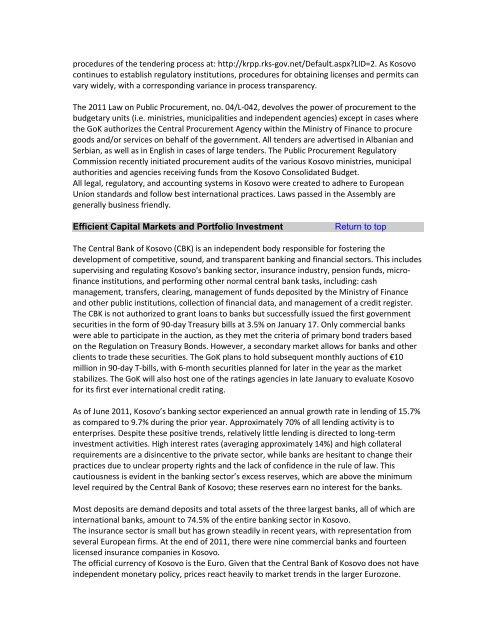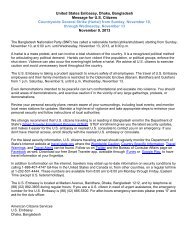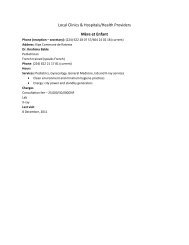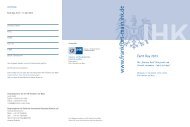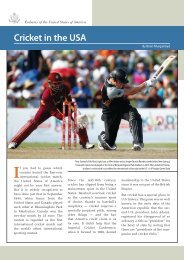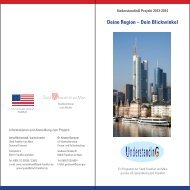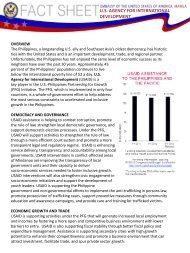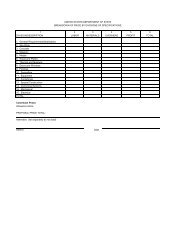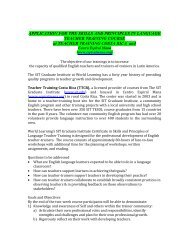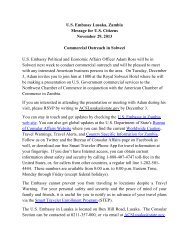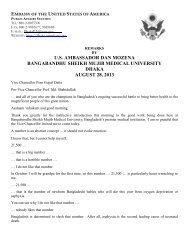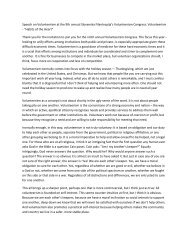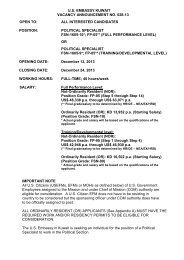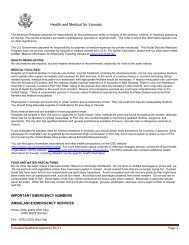Doing Business in Kosovo - US Department of State
Doing Business in Kosovo - US Department of State
Doing Business in Kosovo - US Department of State
You also want an ePaper? Increase the reach of your titles
YUMPU automatically turns print PDFs into web optimized ePapers that Google loves.
procedures <strong>of</strong> the tender<strong>in</strong>g process at: http://krpp.rks-gov.net/Default.aspx?LID=2. As <strong>Kosovo</strong><br />
cont<strong>in</strong>ues to establish regulatory <strong>in</strong>stitutions, procedures for obta<strong>in</strong><strong>in</strong>g licenses and permits can<br />
vary widely, with a correspond<strong>in</strong>g variance <strong>in</strong> process transparency.<br />
The 2011 Law on Public Procurement, no. 04/L-042, devolves the power <strong>of</strong> procurement to the<br />
budgetary units (i.e. m<strong>in</strong>istries, municipalities and <strong>in</strong>dependent agencies) except <strong>in</strong> cases where<br />
the GoK authorizes the Central Procurement Agency with<strong>in</strong> the M<strong>in</strong>istry <strong>of</strong> F<strong>in</strong>ance to procure<br />
goods and/or services on behalf <strong>of</strong> the government. All tenders are advertised <strong>in</strong> Albanian and<br />
Serbian, as well as <strong>in</strong> English <strong>in</strong> cases <strong>of</strong> large tenders. The Public Procurement Regulatory<br />
Commission recently <strong>in</strong>itiated procurement audits <strong>of</strong> the various <strong>Kosovo</strong> m<strong>in</strong>istries, municipal<br />
authorities and agencies receiv<strong>in</strong>g funds from the <strong>Kosovo</strong> Consolidated Budget.<br />
All legal, regulatory, and account<strong>in</strong>g systems <strong>in</strong> <strong>Kosovo</strong> were created to adhere to European<br />
Union standards and follow best <strong>in</strong>ternational practices. Laws passed <strong>in</strong> the Assembly are<br />
generally bus<strong>in</strong>ess friendly.<br />
Efficient Capital Markets and Portfolio Investment Return to top<br />
The Central Bank <strong>of</strong> <strong>Kosovo</strong> (CBK) is an <strong>in</strong>dependent body responsible for foster<strong>in</strong>g the<br />
development <strong>of</strong> competitive, sound, and transparent bank<strong>in</strong>g and f<strong>in</strong>ancial sectors. This <strong>in</strong>cludes<br />
supervis<strong>in</strong>g and regulat<strong>in</strong>g <strong>Kosovo</strong>'s bank<strong>in</strong>g sector, <strong>in</strong>surance <strong>in</strong>dustry, pension funds, micr<strong>of</strong><strong>in</strong>ance<br />
<strong>in</strong>stitutions, and perform<strong>in</strong>g other normal central bank tasks, <strong>in</strong>clud<strong>in</strong>g: cash<br />
management, transfers, clear<strong>in</strong>g, management <strong>of</strong> funds deposited by the M<strong>in</strong>istry <strong>of</strong> F<strong>in</strong>ance<br />
and other public <strong>in</strong>stitutions, collection <strong>of</strong> f<strong>in</strong>ancial data, and management <strong>of</strong> a credit register.<br />
The CBK is not authorized to grant loans to banks but successfully issued the first government<br />
securities <strong>in</strong> the form <strong>of</strong> 90-day Treasury bills at 3.5% on January 17. Only commercial banks<br />
were able to participate <strong>in</strong> the auction, as they met the criteria <strong>of</strong> primary bond traders based<br />
on the Regulation on Treasury Bonds. However, a secondary market allows for banks and other<br />
clients to trade these securities. The GoK plans to hold subsequent monthly auctions <strong>of</strong> €10<br />
million <strong>in</strong> 90-day T-bills, with 6-month securities planned for later <strong>in</strong> the year as the market<br />
stabilizes. The GoK will also host one <strong>of</strong> the rat<strong>in</strong>gs agencies <strong>in</strong> late January to evaluate <strong>Kosovo</strong><br />
for its first ever <strong>in</strong>ternational credit rat<strong>in</strong>g.<br />
As <strong>of</strong> June 2011, <strong>Kosovo</strong>’s bank<strong>in</strong>g sector experienced an annual growth rate <strong>in</strong> lend<strong>in</strong>g <strong>of</strong> 15.7%<br />
as compared to 9.7% dur<strong>in</strong>g the prior year. Approximately 70% <strong>of</strong> all lend<strong>in</strong>g activity is to<br />
enterprises. Despite these positive trends, relatively little lend<strong>in</strong>g is directed to long-term<br />
<strong>in</strong>vestment activities. High <strong>in</strong>terest rates (averag<strong>in</strong>g approximately 14%) and high collateral<br />
requirements are a dis<strong>in</strong>centive to the private sector, while banks are hesitant to change their<br />
practices due to unclear property rights and the lack <strong>of</strong> confidence <strong>in</strong> the rule <strong>of</strong> law. This<br />
cautiousness is evident <strong>in</strong> the bank<strong>in</strong>g sector’s excess reserves, which are above the m<strong>in</strong>imum<br />
level required by the Central Bank <strong>of</strong> <strong>Kosovo</strong>; these reserves earn no <strong>in</strong>terest for the banks.<br />
Most deposits are demand deposits and total assets <strong>of</strong> the three largest banks, all <strong>of</strong> which are<br />
<strong>in</strong>ternational banks, amount to 74.5% <strong>of</strong> the entire bank<strong>in</strong>g sector <strong>in</strong> <strong>Kosovo</strong>.<br />
The <strong>in</strong>surance sector is small but has grown steadily <strong>in</strong> recent years, with representation from<br />
several European firms. At the end <strong>of</strong> 2011, there were n<strong>in</strong>e commercial banks and fourteen<br />
licensed <strong>in</strong>surance companies <strong>in</strong> <strong>Kosovo</strong>.<br />
The <strong>of</strong>ficial currency <strong>of</strong> <strong>Kosovo</strong> is the Euro. Given that the Central Bank <strong>of</strong> <strong>Kosovo</strong> does not have<br />
<strong>in</strong>dependent monetary policy, prices react heavily to market trends <strong>in</strong> the larger Eurozone.


